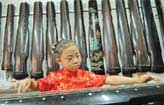Center
Rural Chinese shake off poverty through self-development
Updated: 2011-07-31 11:21
(Xinhua)
BEIJING - On a muggy summer day in Xiuning County of central Anhui Province, Wu Fengfeng still chops wood with a five-kilogram carpenter axe in a workshop of the non-profit Desheng Carpentry School.
The 18-year-old boy, who is from a poor rural family in Xiuning, said his only task now is to master the techniques of making the four-sided "immortal eight" table and palace chair -- two types of traditional Chinese furniture -- so that he can "graduate soon and make money."
As part of Xiuning's development-oriented alleviation campaign that started in 2002, the carpentry school aims at improving professional skills through vocational training of people living in the county's poverty-stricken areas, said an official with the county's poverty alleviation office.
"My academic performance isn't good and studying in high school costs too much for my family," Wu explained with a shy smile, as he persuaded his parents to send him to Desheng Carpentry School, instead of a high school, when he graduated from junior middle school two years ago.
However, studying in the carpentry school doesn't necessarily mean a bleak future.
Every March the non-profit school that provides free carpentry training recruits about 30 students from among over 100 candidates of poor rural families, and academic performance isn't an entry requirement.
Thus far, all 146 graduates of the school have obtained jobs with an annual income of about 40,000 yuan (6,208 U.S. dollars).
"One qualified graduate with vocational training can help the whole family climb out of poverty completely," said Jin Tao, head of the county government.
A meeting of the Political Bureau of the Central Committee of the Communist Party of China (CPC) discussed the development-oriented Poverty Reduction Program for Rural China (2011-2020) earlier this year, and stressed "constantly improving the ability of self-development for poverty-stricken people."
By 2010, the campaign reduced the impoverished population in this area to 9,900, far from 2002's figure of 31,400, and the area's poverty incidence dropped from 11.5 percent in 2002 to 4 percent in 2010, according to the county's poverty alleviation office.
The school's courses include standard classroom learning, basic carpentry skills and on-the-job training, all designed to improve the student's practical ability.
In 2009, Esquire magazine (Chinese edition) listed the school as one of the "sixty new hopes for China."
Xiuning is among the beneficiaries of the continuing nationwide development-oriented poverty alleviation program China set in motion in the mid-1980s, which is different from the previous direct financial transfers because it focuses on encouraging self-development of poverty-stricken areas and people.
In Liangshan Yi Autonomous Prefecture in southwest Sichuan Province, the program implemented new farming methods from local villagers' self-conducted farming experiments help boost local economy.
The success of the program allowed local farmer Ma Xiari to move from a mountainside-thatched cottage to a brick-built and furnished new house two years ago.
Liangshan has been afflicted with poverty for years because of adverse natural conditions and lack of education and technology resources.
However, local officials in the prefecture's Pushi Village, through self-conducted experimental farming, found that the prefecture's high altitude provides a favorable geographical location and agro-ecological conditions for off-season vegetable growing.
From 2005, residents in Pushi Village began to grow cool-season vegetables such as potatoes and cabbage on mountainside in March and July, respectively, using methods obtained through the farming experiments as a measure to alleviate poverty. Previously, the mountainside was only used for small-scale sheep breeding.
"Before sheep breeding was barely enough to feed my family, but now, because of the income from the off-season vegetable sales, I can afford better food for my 4-year-old son," Ma said.
The village also established a vegetable guild to help the villagers facilitate the sales and marketing of vegetables.
As a result, the annual per-capita income in Pushi increased from 500 yuan in 2005 to over 3,100 yuan in 2010, said Limuzige, local Party chief of Pushi village.
China's national poverty level was set at 1,274 yuan per capita net annual income in 2010, according to a statement posted on the official website of National Bureau of Statistics of China.
Over the past decade, a total of 67.34 million people in China have shaken off poverty, and the poverty incidence has declined from 10.2 percent in 2000 to 2.8 percent in 2010, said the statement.
China has made remarkable achievements in poverty alleviation, as the number of the impoverished declined from 250 million in 1978 to 26.88 million at the end of 2010. China is also the first country to meet the poverty-reduction target stipulated in the UN Millennium Development Goals.

Specials

Carrier set for maiden voyage
China is refitting an obsolete aircraft carrier bought from Ukraine for research and training purposes.
 Photo
Photo  Video
Video

Pulling heart strings
The 5,000-year-old guqin holds a special place for both european and Chinese music lovers

Fit to a tea
Sixth-generation member of tea family brews up new ideas to modernize a time-honored business